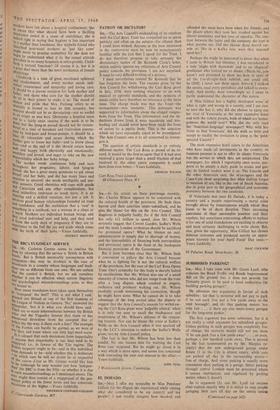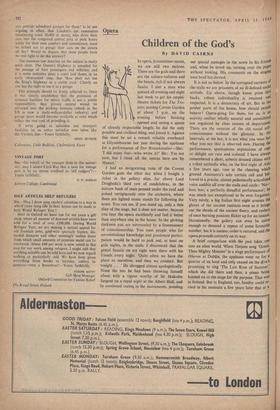SUBSIDISED PARKING?
SIR.-May I take issue with Mr. Gavin Lyall, who criticises the Road Traffic and Roads Improvement Bill on the ground that it does not provide for Treasury grants to be paid to local authorities for building parking garages?
He advances two arguments in favour of such subsidies : (a) that 'a motorist will not pay to park if he can park free just a few yards away in the next borough'; and (h) that parking meters 'are only fair . . . if there are also multi-storey garages for the long-term parker.'
The first argument has some substance; but it is not really a valid argument for subsidised garages. Unless parking in such garages was completely free of charge, the motorist would still not use them `if he can park free a few yards away' . . . or even, perhaps a few hundred yards away. This is proved by the fact (commented on by Mr. Marples re- cently) that the new underground garage under Route 11 in the City is almost empty, while cars are parked all day in the surrounding streets- free of charge. And street parking is usually more convenient than parking in a garage. Street parking through central London must be prevented where it causes obstruction; and regulated by parking meters where it doesn't.
As to argument (h), can Mr. Lyall (or anyone else) explain exactly why it is Unfair to stop people garaging their cars all day on the streets unless (Continued on page 542)
you provide subsidised garages for them? Is he not arguing, in effect, that London's car commuters (numbering some 30,000 or more), who drive their cars into the congested central area at peak hours solely for their own comfort and convenience, must be bribed not to garage their cars on the streets all day? Would he dispute that these people have no real right to do this anyway?
The common law doctrine on the subject is really quite clear. The Queen's Highway is intended for the passage of foot passengers and vehicles; and it is some centuries since a court laid down, in an early 'obstruction' case, that 'thou shalt not use the King's Highway as a stable yard.' Clearly no one has the right to use it as a garage.
This principle should be firmly adhered to. Once it was clearly established that the provision of terminal facilities for motor traffic is not a public responsibility, then private capital would be attracted into the parking business (which in the US is now a multi-million-dollar industry) and garage space would become available at rates which reflect the true cost of providing it.
If we're going to subsidise any transport facilities, let us rather subsidise new tubes like the Victoria line.—Yours faithfully, NIGEL SF.YMER



































 Previous page
Previous page